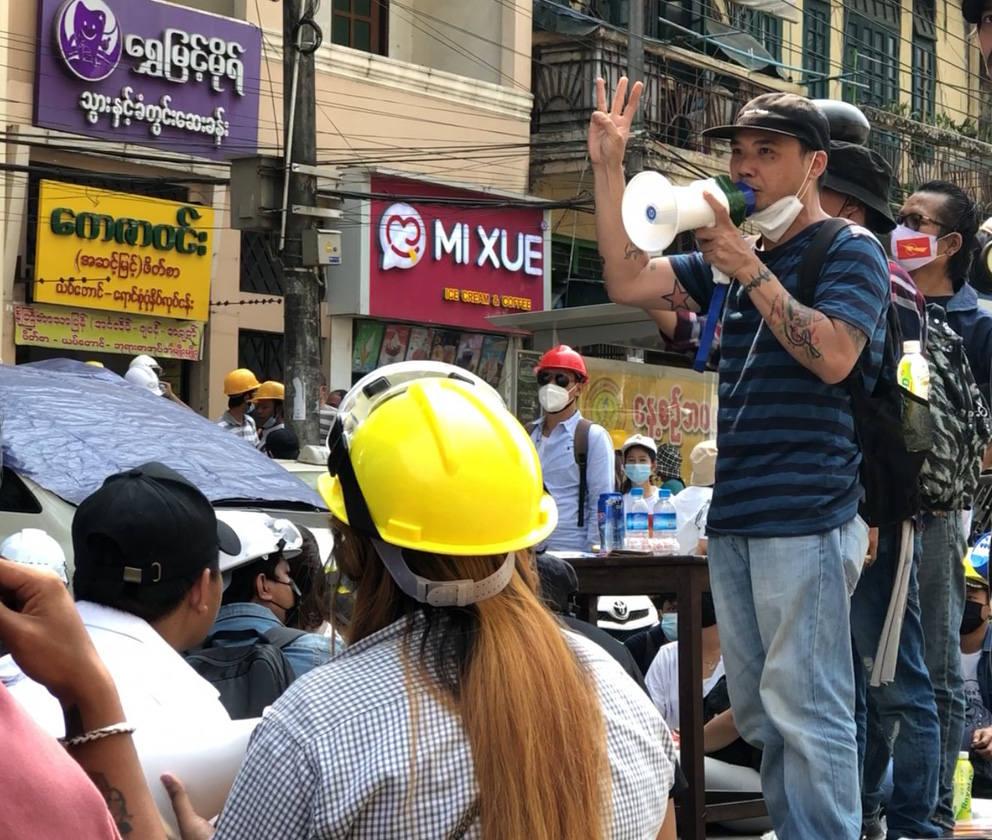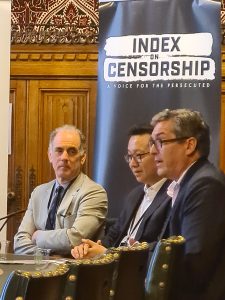26 Jul 2022 | Asia and Pacific, Europe and Central Asia, News and features

Phyo Zayar Thaw gives a speech in Myanmar during a protest in 2021. Photo: Maung Sun
Kyaw Min Yu and Phyo Zayar Thaw were prominent voices in the democracy movement in Myanmar. But on 25 July 2022, state news outlet Global New Light of Myanmar released a statement claiming that they had been executed on the grounds of “terror acts.”
Min Yu, also known as Ko Jimmy, was a 53-year-old veteran of the 88 Generation Students Group formed during the 1988 uprising, which advocated against the country’s military regime. He had spent much of the time since in prison, first 15 years for his participation as a student leader in the uprising, and then five years for leading protests during the Saffron Revolution in 2007, a movement sparked by huge fuel price increases.
Throughout his time in and out of prison, Min Yu wrote several books including self-help book Making Friends and fiction The Moon in Inle Lake. He also wrote a plethora of political short stories that were published in Japan under the pen name Pan Pu Lwin Pyin.
Min Yu was arrested again in October 2021, during a raid. A warrant had been put out for his arrest after he made social media posts critical of the military junta coup in February of that year. He had been in hiding ever since. He was accused of advising the National Unity Government as well as hiding weapons at an apartment in Yangon. He leaves behind his wife and fellow activist Nilar Thein and their daughter Nay Kyi Min Yu, as well as his eternal work advocating for fundamental freedoms.
Zayar Thaw was a 41-year-old rap star turned politician for the National League for Democracy party. His band Acid often released songs with lyrics containing thinly-veiled attacks on the military, which aggravated the junta. During his transition from rap star to lawmaker, he became a close ally of pro-democracy advocate Aung San Suu Kyi and accompanied her to international meetings.
In 2000, Acid released Myanmar’s first hip-hop album, which remained number one on the Burmese charts for more than two months – a testament to the relatability of the lyrics highlighting the hardships of life in Myanmar which drew them into danger.
Taking an even more vehement stance against Myanmar’s military rulers, Zayar Thaw later co-founded the youth movement Generation Wave, following the Saffron Revolution. The activists used graffiti and pamphlets to spread their pro-democracy messages around the nation while also circulating anti-government films. Several members, including Zayar Thaw, were arrested and imprisoned for their participation.
From hip hop and activism, Zayar Thaw moved firmly into politics. In 2012, the same year Aung San Suu Kyi was elected, he became a member of Pyithu Hluttaw, the lower house of Burmese Parliament.
In November 2021, Zayar Thaw was arrested again by the Myanmar military junta for offenses ranging from “possession of explosives” to “financing terrorism.”
Both Min Yu and Zayar Thaw were sentenced to death in January 2022. They were convicted by a closed military court and their appeals were rejected. Human rights experts have spoken out against their treatment.
Global New Light of Myanmar claimed that the two men were charged under counter-terrorism laws, but have given no information about when or how they were executed. The Myanmar government’s horrific grab for power and disregard for human life has left the loved ones of Min Yu and Zayar Thaw with few answers. Both families have submitted applications for information on the unjust executions, but are unsure of what will happen now.
The families of Min Yu and Zayar Thaw have lost their sons, their brothers, their spouses, and their fathers. But their fight for basic freedoms in Myanmar lives on through their organisations and art.
1 Jul 2022 | China, Hong Kong, News and features

Mark Clifford, Kris Cheng and Benedict Rogers speak in parliament ahead of the 25th anniversary of the handover of Hong Kong
“The fear of possibly being attacked by the far-reaching Chinese Communist Party is always there.” These were the words of political activist Nathan Law. His background in peaceful activism and outspoken pro-democratic views have made him a target of the Chinese Communist Party.
Law, who is best known as one of the student leaders of the Umbrella Movement and who was the youngest legislator in Hong Kong history, fled Hong Kong in 2020, a few days before the implementation of the National Security Law (NSL). In the same year, Law was listed as one of the 100 most influential individuals in the world by Time Magazine.
Law was speaking at an event organised by Index on Censorship and The Committee for Freedom in Hong Kong inside parliament, the heart of British politics. The purpose? To highlight the actions of the Chinese government and showcase the fearmongering tactics used to manipulate and intimidate all Hong Kongers, both domestic residents and those abroad, ahead of the 25th anniversary handover of Hong Kong from British rule to Beijing rule.
The event was chaired by Index on Censorship’s Jemimah Steinfeld and hosted by Neil Coyle, a Member of Parliament. Other panellists included Mark Clifford, former editor-in-chief for both The Standard and The South China Morning Post as well as president of the Committee for Freedom in Hong Kong, Evan Fowler, a writer and researcher from Hong Kong, Benedict Rogers, the CEO of Hong Kong Watch, and Kris Cheng, a journalist who used to work at Hong Kong Free Press.
Coyle kicked it off by setting the tone of the evening’s conversation: “What we [are] discussing and hearing today in this building would guarantee the panellists’ arrests and imprisonments were they to say the same in Hong Kong today.”
The implementation of the NSL has placed a stranglehold on dissent. While the punishment for violating the law is clear — up to life in prison for some “offences”— how the Chinese government interprets and manipulates the law falls into a grey zone, leaving many Hong Kong residents in a perpetual state of fear.
The NSL was a turning point, though Clifford said that “Hong Kong was always living on borrowed time”. But he spoke of how pre-handover it wasn’t always obvious the direction China would take, as the last governor of Hong Kong, Chris Patten, had created a much more pluralistic society. Speaking of this period, Clifford said that “the Chinese rightly understood that once Hong Kong people tasted freedom and democracy, it was going to be hard to put the genie back in the bottle.”
Rogers also spoke of a time where there was still hope. “For the five years that I lived and worked in Hong Kong, those first five years after the handover, that sense of foreboding when I got there appeared to have largely receded. There was a sense that One country, Two systems, by and large, was working pretty well. Hong Kong felt pretty free.”
By the time Rogers left in 2002, however, he started to see the subtle warning signs turn increasingly more substantial. “I saw some worrying signs that made me decide after five years it was time for me to move on.”
Fowler recalled the days surrounding the Handover. “It’s now being celebrated as this great event where Hong Kong was returned to the Motherland, where all the comrades happily embraced returning to the Communist fold. I really didn’t feel that at all. The feeling that I remember was that people didn’t know what was going to happen. Taking what [Clifford] said earlier about the old colonial saying ‘borrowed place on borrowed time,’ there really was a sense of that.”
Fowler went on to share an analysis of two different eras in history. “I suppose the big transition was before 1997. No matter how things were going in Hong Kong, there was always this feeling that you didn’t know what future lay in store, and ultimately you knew that that future wasn’t to be decided by you.”
Post-1997, Fowler said the general consensus was that people believed most issues had been resolved, but that it certainly wasn’t a wonderful celebration every time. Today though the CCP is trying hard to erase any memories of protest and misgivings from the time, as we recently reported here.
Chinese propaganda is something panellist Cheng was accustomed to throughout his childhood in Hong Kong. At school, Cheng went on a “national education tour” in Beijing. Cheng said the tour was a way to influence the minds of younger generations. “The whole thing is to let you have the experience in the Chinese government and capital, to know what was going on in China, to build that identity. I called it ‘softcore propaganda.’”
Cheng used this experience as motivation for his career as editorial director at Hong Kong Free Press. It also made Cheng realise the dissimilarities between Hong Kong and China. “I don’t think, at the time, that there was some sort of Hong Kong identity in the Hong Kong people, but it actually made me feel like ‘Wait, we [Hong Kongers] are a bit different.’”
Themes of oppression and manipulation were hit on heavily throughout the event. Law argued that the “fight of Hong Kong is not only for Hong Kong people”. He believes that the democratic nations of the world must “stand at the forefront of the global resistance and pushback against the rise of authoritarianism. At the end of the day, if we cannot contain the aggression of the Chinese Communist Party, there will be no ability to make a change in Hong Kong.”
“If the case of Hong Kong can remind us how fragile freedoms and democracy are and how underprepared we have been for the past few decades, then it can remind everyone we need resources and [need] to form global alliances to heckle these dictators’ aggression,” said Law.
He urged individuals on the panel and those within the room to “not let the government forget the atrocities committed against protesters and pro-democracy movements, at least until we have gathered enough mechanisms to hold these human rights perpetrators accountable.”
You can listen to a recording of our Hong Kong event here.


